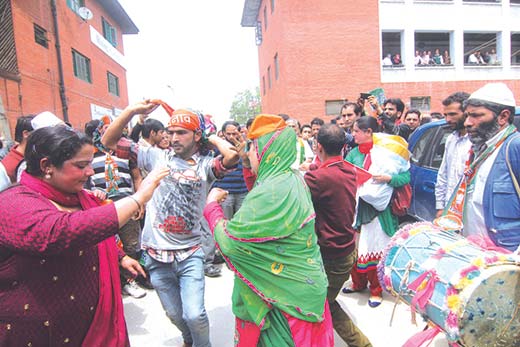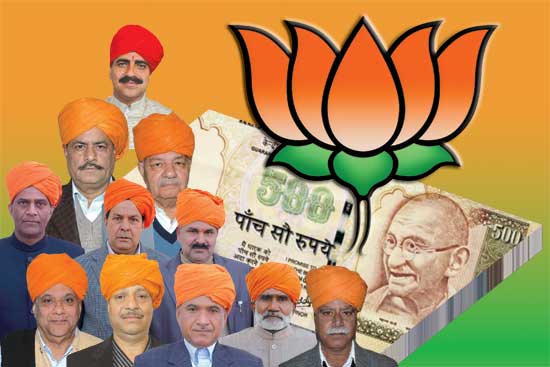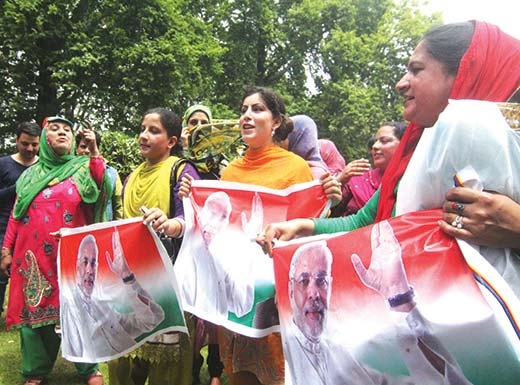BJP’s over-ambitious plan to emerge the single largest party in J&K is an intelligent ideation. It has unnerved both the unionists and separatists as it is convincingly doable to a good extent. But the real objective seems the rightwing party getting desperate to earn legitimization by courting a secular partner, reports R S Gull

PDP spokesman Naeem Akhter has witnessed many ups and downs in state politics, mostly as a government official and lately by voluntarily leaving government and joining politics. Ever since Narendra Modi has become Prime Minister, he has been telling almost everybody, his favourite line: for Modi, the path to statesmanship and reconciliation passes through Kashmir.
His argument is logical. Akhter says that Modi has a sectarian identity as most of the Indian voters have not been supportive to him. His Gujarat baggage will always question his commitment to inclusiveness and that his foreign policy is essentially dominated by what he does with Pakistan. Kashmir being India’s major Muslim majority state and Pakistan being involved historically with the state, it is an ideal place to manage both the concerns: development of minorities and starting reconciliation with Pakistan. That was the perfect doctrine that his predecessor in NDA Atal Behari Vajpayee had successfully attempted and left his indelible marks as a statesman.

Pic: Bilal Bahadur
With almost a quarter in office, it seems BJP has taken this seriously. The only problem is that the idea is being implemented inversely. Instead of BJP becoming liberal in accommodating the concerns of J&K and its political parties and sustaining peace talks with Pakistan, the party has drawn an ambitious plan of taking over the state. Once state is with the party, they will have all the roads open for all the reconciliations within and outside the LoC!
That is exactly what is happening, at least in the newspapers and the backroom offices of the right-wingers in Srinagar, Jammu and Delhi. Encouraged by engineering ‘reverse polarization’ in UP, Amit Shah’s team has drawn up a multi-pronged intelligent plan. Though it is officially packaged as 44+, the minimum number of seats required for a political party to form government in 87-member assembly, the idea is to take the BJP seats to a new high. Given the availability of ‘free floating electrons’ who are always ready to get close to power, there is a probability of making the plan partly possible.
J&K’s assembly has 87 elected berths and two nominated. The dispersal is like this: Jammu has 37 seats, Kashmir has 46 and Ladakh has 04. Put simply, there are 21 assembly segments in Jammu which have clear Hindu majority. There are two segments in Leh which are predominantly Buddhist. The rest are Muslim majority seats with some of them having sizable pockets of non-Muslims like Zanskar in Kargil, Haba Kadal in Srinagar or Tral in Pulwama. Apart from Kashmir that has completely homogenous population, there are 16 segments in Jammu and two in Kargil which are predominantly Muslim. BJP rarely had a landslide mandate in its main support base. It had only one seat in 1996 and two in 2002. After playing the Amarnath land row to its advantage and leveraging the situation by enforcing economic blockade on the rest of the state. That paved the way for securing 11 seats for the first time in history. But having achieved so much for the first time, the party could not stay together. In an internal election for the state’s legislative council, seven of the 11 BJP lawmakers polled their votes for the ruling coalition candidate ignoring their own!
BJP rarely had a landslide mandate in its main support base. It had only one seat in 1996 and two in 2002. After playing the Amarnath land row to its advantage and leveraging the situation by enforcing economic blockade on the rest of the state. That paved the way for securing 11 seats for the first time in history. But having achieved so much for the first time, the party could not stay together. In an internal election for the state’s legislative council, seven of the 11 BJP lawmakers polled their votes for the ruling coalition candidate ignoring their own!
But the last Lok Sabha election changed the fate of the party. Riding on Modi wave, the party managed securing both the seats from Jammu and one in Ladakh. Soon after, it started putting its house in order, got all the ‘rebels’ together and started targeting cashing-on the wave, yet again.
In this scenario, reports appearing in media from Srinagar to Delhi, suggest BJP will employ a set of approaches to tackle things. The first is consolidation of the Hindu vote. That is what the party did in UP. It consolidated the Hindu vote and left the minorities free to choose their candidate. It made a big difference as Amit Shah emerged the king of the change.
This part of the strategy is apparently fatal for the Congress, the party that has been the single biggest gainer from state’s Hindu heartland. Congress has rooted its kingmaker status from Jammu where it has invariably getting most of the support that helped it stay in power for the last two terms which included an aborted term of Ghulam Nabi Azad, as the first Kashmiri speaking Chief Minister of J&K from Jammu. In the last Lok Sabha poll, Azad suffered a severe defeat.
BJP is employing almost the same strategy for Ladakh, more for Leh than Kargil. It hawked UT status to Ladakh during polls and managed eroding the base of Congress substantially. To consolidate the gains, Modi visited the state twice – once to Jammu and then to Ladakh. In a bid to treasure the vote bank that the new government means business and is daring enough to upset the traditions, Modi government cancelled the secretary level talks with Pakistan in protest against Pakistan envoy meeting Kashmiri separatists. Though debate is raging over Modi’s foreign policy but the fact is the cancellation was aimed at addressing the local constituency in J&K.
Sources in the state government suggest that after Pakistan High Commissioner extended his invitation, the initial response from Delhi was that the invitees should be kept under house arrest to prevent the meeting. But it was at the eleventh hour that they were permitted to go. The stage was actually set to make some quick gains from the move and it seems it has helped.
Congress, the main rival of the BJP in Jammu, was unnerved by the cancellation. One senior leader was so frustrated that he cut short his Jammu visit and flew back to Srinagar. Another threw up a new target: to have a Hindu Chief Minister for the state. The talks cancellation move has forced Congress to explore new ideas.

For the seats lacking a Hindu majority, BJP is consolidating minorities in first go to be followed up by intense fracture of the mandate between three secular parties: NC, PDP and Congress. There is possibility of Pahari versus Gujjar versus Kashmiri and rural versus urban being played very intelligently to ensure the trifurcation of the major chunk of votes.
But the most ambitious part of the plan is how the party wants to tackle Kashmir where there are 46 segments. It has two ingredients. In the first go, BJP, according to reports wants to leverage the separatist sponsored boycott of the polls. The party has identified around eight seats in Kashmir valley which have been reporting least polling in last many elections. The party has launched a country wide programme to enlist the new voters from the Kashmiri migrant community and is keen to see that they vote for the BJP. At places where the number of migrant votes are more than the number of votes polled in last many elections, it is possible that BJP can sweep these seats. If that happens then Sopore – a seat that Syed Ali Geelani once represented – will now have a BJP man as its lawmaker. This situation can actually make another BJP candidate win in Amira Kadal where PDP’s Altaf Bukhari and NC’s Nasir Sogami are in direct contest. It is from this segment where NC’s earlier MLA Mohammad Shafi Bhat’s (he won uncontested at the peak of militancy) dental surgeon daughter Hina Shafi will be a BJP candidate. She gave up her job a few months back and joined politics. After Modi was sworn in, Ms Bhat joined it.
Second element of the Kashmir plan is to get local allies. BJP has been talking with Panthers Party for a long time and is keen to see it an ally. In Kashmir, it has had talks with Peoples’ Conference that Sajjad Ghani Lone is heading. Reports suggest that BJP MP, who is in-charge of Kashmir, had four meetings with Lone. The party has no problem in supporting Lone to be the next chief minister of the state, according to the reports emanating from Delhi. Lone has maintained a silence over the reports, so far. Apart from meetings, he has not confirmed any tie-up, so far.
Allies apart, the party is ready to help any new grouping in Kashmir, and not in Jammu. Newspaper reports suggest that one such group of “intellectuals” will take off soon. Parties and groups keen to fracture the mandate or improve the participation are used to increasing the number of contestants. That is about to happen in 2014 election again.
Other things in BJP’s arsenal are interesting. J&K is unlikely to go to polls with three other states. Indications suggest that 3 among 4 states from mainland India will go to polls first and J&K will follow separately around November so that it gets more and specific attention. Interestingly, lot of declared contestants from the two parties – NC and PDP, are receiving calls from “friends” counselling them that given the BJP is in absolute majority at the centre, they must have a tie-up for “better development” of the state. This has annoyed many people who feel as if the devolution of funds to the state are being managed by the BJP treasurer and not by India’s finance and planning ministries.

What this intelligent plan means. It is simple. BJP wants to create a scare in Kashmir so that people come out and vote to ensure the BJP does not embarrass them by taking away a few seats. If they do not come out, Kashmir will get a new identity, at least for the sake of records and history. It obviously will help BJP take credit for doing unthinkable in Kashmir.
If the political parties in the state – the secularists, are really so terrified by the BJP growth, they may hover around Amit Shah for a possible tie-up. This is more important for BJP to hard-sell its new image that it is no more a party that cannot have allies. If it can have allies in Kashmir, it can have allies anywhere in India. That will help Modi manage part of his package from his Gujarat days.
In case, the plan was not off the script and BJP could hit its target, ruling J&K even as an ally, will make a big difference. Congress has ruled the state using the backdoor and fraud. BJP will rule the state using democracy intelligently. It will help BJP-RSS to address Jammu better. Surviving on the allegations that the power and authority has been taken away by Kashmir throughout and it is better for Jammu to separate and become a new state, this situation can help BJP reassure Jammu that while being a minority in the state, it can still have adequate stake-holding in power and governance. Modi government apparently is unwilling to fiddle with the territorial integrity of J&K state for making Jammu happy.
While in power, there are various possibilities of social engineering. The party may not be able to abrogate Article 370 that has already been eroded; it still can change many things that will reduce the special status of the state. These could be related to land laws, state subject norms and doing away with the barriers preventing laws that state might be resisting.
As the blueprint is out, the parties – from either side of the ideological divide, are quiet. Nobody has reacted to the idea. Will the Hurriyat opt for a harsh boycott as Shabir Shah hinted in his press conference after meeting Pakistan envoy? Are NC and PDP going to Jammu and opening their offices in migrant camps to ensure the Pandit community does not abandon the secularists formally? To fight BJPs Hindu card, is there is a possibility of NC-PDP patch up? If the three secular parties may not have a common ground, is there a possibility of some tactical understanding? These are things that might require answers in coming days ahead of the interesting elections of 2014.















